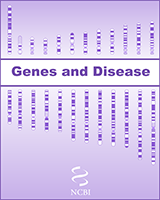NCBI Bookshelf. A service of the National Library of Medicine, National Institutes of Health.
National Center for Biotechnology Information (US). Genes and Disease [Internet]. Bethesda (MD): National Center for Biotechnology Information (US); 1998-.

DiGeorge syndrome is a rare congenital (i.e. present at birth) disease whose symptoms vary greatly between individuals but commonly include a history of recurrent infection, heart defects, and characteristic facial features.
DiGeorge syndrome is caused by a large deletion from chromosome 22, produced by an error in recombination at meiosis (the process that creates germ cells and ensures genetic variation in the offspring). This deletion means that several genes from this region are not present in DiGeorge syndrome patients. It appears that the variation in the symptoms of the disease is related to the amount of genetic material lost in the chromosomal deletion.
Although researchers now know that the DGS gene is required for the normal development of the thymus and related glands, counteracting the loss of DGS is difficult. Some effects, for example the cardiac problems and some of the speech impairments, can be treated either surgically or therapeutically, but the loss of immune system T-cells (produced by the thymus) is more challenging and requires further research on recombination and immune function.
Related diseases
- Genome view see gene locations
- Entrez Gene collection of gene-related information
- BLink related sequences in different organisms
- Research articles online full text
- Books online books section
- OMIM catalog of human genes and disorders
- GeneReviews a medical genetics resource
- Information and support for DiGeorge syndrome
- GeneLocus Links
- DiGeorge syndrome - Genes and DiseaseDiGeorge syndrome - Genes and Disease
Your browsing activity is empty.
Activity recording is turned off.
See more...
